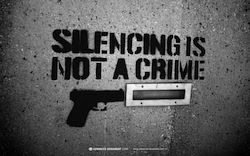You had to expect there would be a final middle finger extended in our direction as Obama headed out the door. Because it’s a regulation, the incoming Administration can’t just undo it on a whim: they have to go through the rule-making process. Alternately, our Republican Congress could fix this issue with legislation, but I wouldn’t hold my breath on it being a priority for them. There are a few interesting claims in the regulation itself, which has appeared in the Federal Register:
Our authority to report the information we include in these final rules stems from section 101(a)(4) of the NIAA, which requires that we provide to the Attorney General for inclusion in the NICS pertinent information included in any record demonstrating that a person falls within one of the categories in 18 U.S.C. 922(g) or (n).3 NIAA section 101(c)(1)(C) does not prohibit us from reporting this information to the NICS.
You see, we just report this stuff to the DOJ. What those meanies do it is their problem, not ours. So don’t think you can blame us, the SSA, for this. This bit below is just pulling justification out of their asses:
The commenters who relied on section 101(c)(1)(C) only cited part of the section in their comments. In its entirety, section 101(c)(1)(C) of the NIAA states: ‘‘No department or agency of the Federal Government may provide to the Attorney General any record of an adjudication related to the mental health of a person or any commitment of a person to a mental institution if
. . . (C) the adjudication or commitment, respectively, is based
3 NIAA 101(a)(4), 121 Stat. at 2161.
solely on a medical finding of disability, without an opportunity for a hearing by a court, board, commission, or other lawful authority, and the person has not been adjudicated as a mental defective consistent with section 922(g)(4) of title 18, United States Code, except that nothing in this section or any other provision of law shall prevent a Federal department or agency from providing to the Attorney General any record demonstrating that a person was adjudicated to be not guilty by reason of insanity, or based on lack of mental responsibility, or found incompetent to stand trial, in any criminal case or under the Uniform Code of Military Justice.’’
We are not reporting information in records based solely on a medical finding of disability without the person being adjudicated as subject to the Federal mental health prohibitor ‘‘consistent with 18 U.S.C. 922(g)(4).’’ The Bureau of Alcohol, Tobacco, Firearms and Explosives (ATF) has clarified through regulations that this prohibition covers individuals who have been determined by a court, board, commission or other lawful authority as a result of marked subnormal intelligence, or mental illness, incompetency, condition or disease to be a danger to himself or to others, or who lacks the mental capacity to contract or manage his or her own affairs.4
The DOJ Guidance specifically indicates that records relevant to the NICS include ‘‘agency records of adjudications of an individual’s inability to manage his or her own affairs if such adjudication is based on marked subnormal intelligence or mental illness, incompetency, condition or disease.’’
What SSA is doing here is pretty clearly and flagrant violation of NIAA, but they rely here on “DOJ Guidance” which is specifically counter to the NIAA. Essentially BATFE has never updated any of their regulations and policies to comply with the NIAA requirements. That’s what SSA is depending on here. They are setting themselves up to take no responsibility for depriving million of SSA recipients of their right to keep and bear arms with no trial or due process whatsoever.
Here’s the thing, regulations can’t be changed at the drop of a hat, but “ATF Guidance” surely can. Will Trump appoint someone who will actually clean up ATF and start making them follow the law for a change?
It’s interesting looking at this and thinking what the Obama Administration is trying to accomplish here, and it’s kind of brilliant in its deviousness:
- Regulations aren’t easy to undo. Much of this will not be noticed by anyone until after Trump takes office. So this regulation will largely blow up in his face and he won’t just be able to undo it. Most people don’t pay attention to politics, and the way this will get noticed is when grandpa has a heart attack and then ends up charged because the responding cops noticed a pistol by the bedside, but yet he has a record with the FBI. Any high profile case in the community will hurt Trump with his base.
- The passage of NIAA was controversial at the time, because GOA and NAGR came up with some very creative ways NIAA would be interpreted. By taking NIAA and pushing it’s language way beyond what it supports, they lend credibility to GOA and NAGR’s fears. That’s bound to re-open the debate. It will be argued that NIAA offered the justification, but I still believe NIAA was the right thing to do, as it required a relief mechanism from mental health disability that did not previously exist. Putting people into NICS en-masse is a trick that dates back to the Clinton Administration. I think using NIAA a justification was a very clever fuck you.
The solution to this should be legislative, if we’re going to fix this permanently. The Gun Control Act’s mental health provisions are outdated, and there was a bill in the last Congress to replace them. That would frustrate the habit of Dem Administrations trying to stuff as many people into NICS as they can get away with.

 By now we’ve all head of the mass shooting at the Fort Lauderdale Airport terminal.
By now we’ve all head of the mass shooting at the Fort Lauderdale Airport terminal. 
